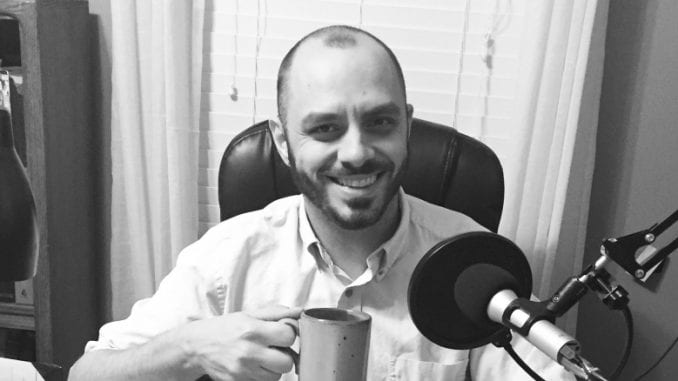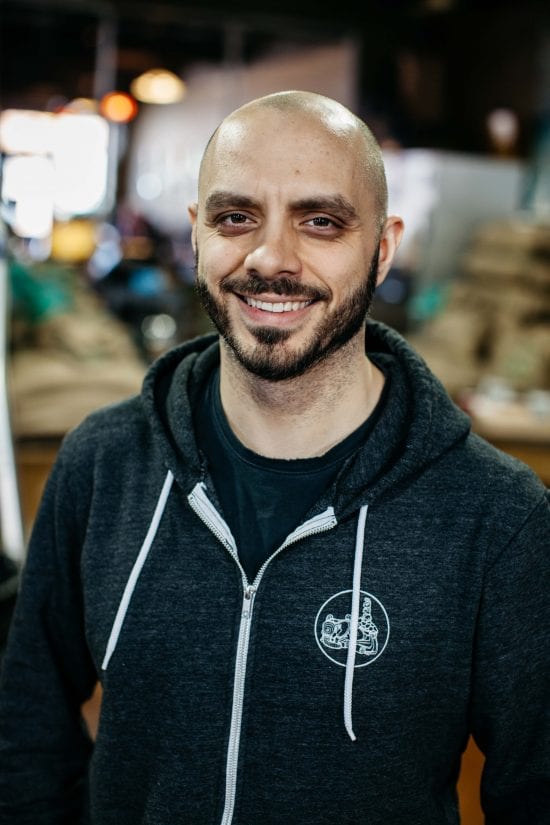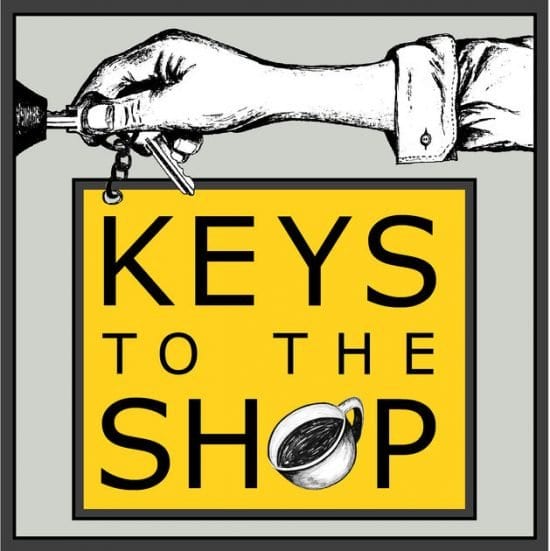
We bring back our series on coffee podcasts in an interview with Chris Deferio, award-nominated host of the Keys to the Shop podcast.
BY LUKE DAUGHERTY
SPECIAL TO BARISTA MAGAZINE ONLINE
Cover photo courtesy of Chris Deferio
A while back, we started a podcast series interviewing hosts of coffee shows. Check out our past interviews with Jared Truby and Chris Baca of Cat and Cloud, Mark Prince of Coffee Geek, Bjørg Brend Laird of Coffee Awesome, and Alex Littlejohn of Coffee Uncut.
Chris Deferio is a coffee veteran closing in on two decades in the industry. His career has included stints as a barista, trainer, manager, and consultant. Over that time he has developed a passion for inspiring greater leadership and management within the industry, which has led to his efforts in creating the America’s Best Coffeehouse competition and, more recently, his Keys to the Shop podcast. We spoke with Chris about his journey in coffee, how his passion for leadership came about, and what he hopes to add to the industry with his efforts.
Luke Daugherty: What did you do in your past life, before coffee?
Chris Deferio: I got into coffee pretty soon after high school, really. I went to a small ministry school and ended up working there for a couple years around 1999-2001. Full-time ministry did not seem like the right fit for me, and my thought at the time was that I was going to pursue a trade craft like carpentry, or something esoteric like becoming a luthier building guitars.
LD: How did you get into coffee? What was your first coffee job?
CD: As I was considering these things, I discovered coffee shops and a love for coffee. I was going to a coffee shop in Northwest Arkansas called Arsagas, which is still going strong there. I loved the atmosphere of the coffee bar—journaling, reading, thinking—and discovered I really loved trying different origins. I got my first taste of specialty coffee on a trip to Tulsa, Okla., at a place called Nordaggios that was serving Caffe Vita at that time (they roast their own now). I got a traditional macchiato, and it opened up the world to me. I never knew coffee could taste like that, and it set me on the course to pursue specialty coffee. My first coffee job was as a barista at Arsagas at a newer store. I was fired from that job! I was passionate and very heartbroken but, looking back, it was probably the right call. It didn’t stop me from pursuing coffee though; I knew that coffee was what I was meant to do.

LD: What types of roles have you held in your various coffee jobs? Did you have a favorite one?
CD: I have been a barista, trainer, manager, operations manager, and consultant. My favorite is kind of a tie between management and training. I’ll choose training though. I love being able to give someone a really solid foundation in coffee, and having an impact on their outlook on hospitality and service as well. Management involves training, but it also involves more focus on operational QC and problem solving around systems and structures that serve to benefit the staff and customers. I love that too. Ha! So really I am cheating and choosing two here.
LD: You’ve been involved with a few different projects aimed at developing other coffee professionals in some way or another, including America’s Best Coffeehouse and, more recently, your Keys to the Shop podcast. What inspired you to develop these initiatives?
CD: In both cases my desire is to develop something that inspires the industry to celebrate, refine, grow, and find joy in the coffee shop and the people who make it run.
LD: Tell me a little bit about America’s Best Coffeehouse. This was dropped from Coffee Fest a few years ago, but I’ve heard a number of people talk about how they appreciated that competition. Can you briefly describe the competition, and what you’d hoped it would contribute to the industry?
CD: ABC was a competition developed with Coffee Fest that was designed to closely simulate a real coffee shop experience. We “secret shopped” applicants, selected top qualifiers, and had them bring a team of three employees to run a fully functional and stocked bar on the show floor for 30 minutes. Teams received 10 minutes to open, 20 minutes for service, and 10 minutes to close. We had tech and sensory score sheets for each section and opened up the comp to attendees to order from a fixed menu that included the teams’ signature drinks. It was intense for the competitors and for us judges, but very rewarding.
My hope for the competition was that it would showcase a shop’s unique culture, energize the staff that may not normally jump at a traditional solo competition, and challenge baristas in areas that would translate directly to what they do at home, such as teamwork, hospitality, heads-up service, consistency, cleanliness, etc. I think we succeeded. We also saw a very diverse range of people in this competition, which was an added bonus. I really loved that competition and, though it is no more, I am hopeful that it may be picked up again. Either way it gave a lot of value to those who went through it, and I am thrilled we got to do it.
LD: How did you get the idea for your Keys to the Shop podcast? What were you hoping it would contribute alongside other coffee podcasts that have popped up in recent years?
CD: A lot of what we have in the way of professional resources in coffee is spread out in many different areas or costs a lot to acquire. I saw a need for a focused, accessible resource that delivers a lot of valuable, actionable, and relevant content for the people working in the shop. I really love and want to spend my career championing the café, and Keys to the Shop was created as my way to help fill that need. The charge for the show is to deliver insights, inspiration, and tools to help people grow as coffee service professionals. I have been just astounded and thrilled to see how it has been able to deliver that. It’s humbling and energizing.

LD: I can imagine there’s a learning curve involved when you jump from barista and shop operations work into creating a podcast. What was that like? How do you fit it in with your full-time work?
CD: It was pretty difficult, honestly. I apprenticed myself with online resources and learned as much as I could about podcasting, content development, etc. Lots of late nights. I sold a guitar to buy equipment in order to start with reasonably good audio quality. The night I launched the first episodes, I was beside myself. It was like being backstage at USBC [United States Barista Championship] all over—self-doubt, quadruple checking everything. Maintaining everything has been fun but also challenging since we do five episodes per month. It just requires that you grab time and opportunity where you can. I was very honored to be nominated for a Sprudgie. Knowing that there are people out there who care enough about the show that they would go through the trouble of voting is the best reward. It can be hard not seeing the impact of the shows as they get sent out into the wilds of the internet. So that was just incredible. Thanks everyone!
LD: You have a pretty wide variety of guests on the podcast—from shop founders, roasters, and green buyers to folks outside of coffee speaking on leadership and management. How do you decide on the guests you choose to interview?
CD: I try to get a good range of people and positions represented on the show. The global coffee shop community runs on a wide variety of people doing many important jobs to prepare and present specialty coffee to their customers, so I feel like it is my duty to pursue that in this show while making sure that the content is highly relevant and impactful. I look for people who are experts in or have a solid, practical, and maybe even transcendent perspective on topics critical to either the running of shops, leading people, understanding the craft of coffee, or the advancing of careers. That also includes bringing in subject matter experts from outside the industry. I want the range to be thorough and balanced when you look at it over a long period of time.
LD: Do you have any particularly interesting guests lined up for 2018?
CD: Although I think we have hosted a decent range of people this last year, I am making it a point right now to pursue a more global and culturally diverse set of guests, so I am excited for that.
LD: What are a few areas in which you would like to see the industry grow or improve over the next few years? Are there any particular companies or individuals you are excited about?
CD: I would love to see the industry grow in its ability to practice excellent leadership at the shop level. Dysfunctional management, leadership, and misuse of power in the shop is, I believe, the number-one thing to address. Improving this will act like a key to unlock a ton of potential that is yet to be seen because of toxic relationships and cultures. This is why leadership and management is a bit of a recurring theme in many of the the episodes of the show—it may be the most important key to the shop.
 ABOUT THE AUTHOR
ABOUT THE AUTHOR
Luke Daugherty has been in the coffee industry for more than 13 years, working as a barista, roaster, and café manager along the way, all the while growing more intrigued with this lovely beverage we all can’t get enough of. He’s an SCA-certified green coffee buyer, and he lives with his wife and three children in Louisville, Ky.

